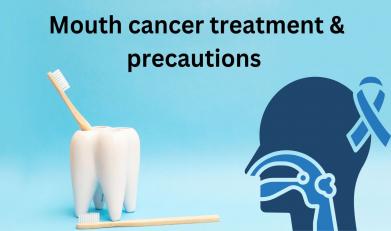

22 Jun, 2024
Mouth cancer, also known as oral cancer, is a type of cancer that develops in any part of the mouth, including the lips, gums, tongue, inner lining of the cheeks, roof of the mouth, and floor of the mouth. Like other cancers, early detection and prompt treatment significantly improve the chances of recovery. This blog will delve into the treatments available for mouth cancer and the precautions one should take to minimize the risk of developing this disease.
The treatment for mouth cancer depends on several factors, including the type, size, location, and stage of the cancer, as well as the patient’s overall health. The primary treatment options include surgery, radiation therapy, and chemotherapy, often used in combination.
Surgical procedures aim to remove the cancerous tissue. There are different types of surgeries based on the cancer’s location and extent :
Tumor Resection: Removal of the tumor and some surrounding healthy tissue.
Neck Dissection: If cancer has spread to the lymph nodes in the neck, these nodes may also be removed.
Reconstructive Surgery: After removing the cancer, reconstructive surgery might be necessary to restore the appearance and function of the affected area. This could involve grafts and dental implants.
Radiation therapy uses high-energy beams to kill cancer cells. It can be used as a standalone treatment or in combination with surgery or chemotherapy.
Chemotherapy involves using drugs to kill cancer cells. It can be administered orally or through an intravenous (IV) line. It’s often used in conjunction with radiation therapy, especially for more advanced stages of cancer.
Targeted therapy drugs specifically attack cancer cells without harming normal cells. These drugs target the cancer cells’ specific genes, proteins, or the tissue environment that contributes to cancer growth and survival.
Preventing mouth cancer involves making lifestyle changes and being aware of risk factors. Here are some key precautions:
Avoid Tobacco Products
Smoking cigarettes, cigars, or pipes, and using smokeless tobacco (snuff and chewing tobacco) are significant risk factors for mouth cancer. Avoiding all forms of tobacco is crucial for prevention.
Limit Alcohol Consumption
Excessive alcohol use is another risk factor. Limiting alcohol intake can reduce the risk of developing mouth cancer.
Maintain Good Oral Hygiene
Regular brushing and flossing, along with routine dental check-ups, help in the early detection of precancerous conditions.
Healthy Diet
A diet rich in fruits and vegetables provides essential vitamins and antioxidants that may reduce the risk of cancer.
Protect Against HPV
Human papillomavirus (HPV) is linked to mouth cancer, particularly oropharyngeal cancer. Practicing safe sex and considering HPV vaccination can lower the risk.
Limit Sun Exposure
Excessive sun exposure increases the risk of lip cancer. Using lip balm with SPF and wearing a wide-brimmed hat can offer protection.
Regular Screening and Awareness
Regular dental check-ups are essential, as dentists can spot early signs of mouth cancer. Awareness of symptoms, such as sores that don't heal, unexplained lumps, and persistent pain, can also lead to early diagnosis and better outcomes.
Mouth cancer is a serious condition, but with early detection and the right treatment, many patients can achieve positive outcomes. Preventive measures and lifestyle changes play a crucial role in reducing the risk. Stay vigilant, maintain good oral hygiene, and consult healthcare professionals regularly to keep your mouth healthy and cancer-free.